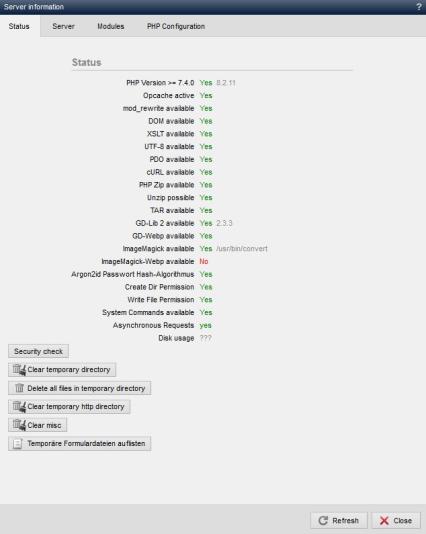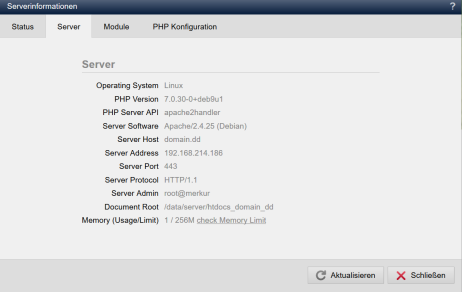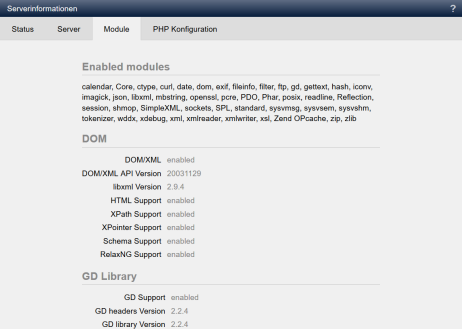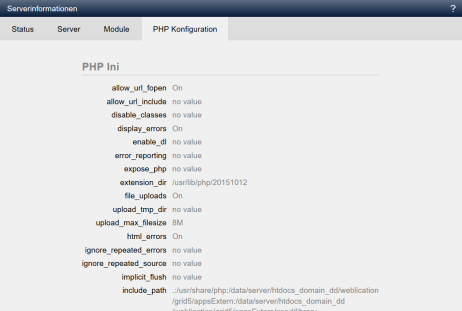Server information
In this section you will find comprehensive information about your server environment. The most important modules and packages, which are a prerequisite for various functions within the software, are already checked here.

Operation
Click on 'Server information' to open the server information in a new tab on the right-hand side.
Status

The 'Status' tab shows you the status of important modules, accesses, etc.
The example shows you that the requirements for the PHP version, cURL library, access to the download server, etc. are met in the relevant installation. You can also see from the example that system commands (system(), exec() ) and asynchronous calls are possible.
Asynchronous calls are used, for example, for
- Keeping the search index up to date (addUrlToIndex via project events)
- Delete project cache (via project events)
- Delete or clean up tmp and tmpHTTP directories of the software
If the display shows a "no" for asynchronous requests, this may be due to htaccess directory protection or other server restrictions, for example. A curl call (curl_multi_exec) via PHP is then prevented. You can also check this using the wNet::getUrlAsync() function, for example.
Also check whether the called host is defined in the local hosts file of the web server.
Since CMS version 14, an attempt is also made to determine the disk space used (disk usage). If this works via a system call(du -sh...), the value is displayed. Otherwise a message is displayed ("Checking disk usage failed!").
The example of Webp support shows that this is given for PHP GD, but not for ImageMagick. In such a case, when using Webp and activated ImageMagick, the Webp support of PHP GD is used.
You can clarify with your provider whether Webp can also be activated for ImageMagick.
'Server security check':
Clicking on this button opens a new window with information on a server security check. This check provides a general assessment of the security of various web server and PHP settings.
Please note that this is no guarantee of a secure environment. The check is merely an aid to securing the application and server environment in the best possible way.
'Clean up temporary system directory':
Click on this button to clean up the system directory for temporary files.
This applies, for example, to temporary files of a Weblic® installation, autosave files, etc.
'Delete all contents of the temporary system directory':
Click on this button to delete the contents of the system directory for temporary files.
Only wPHP cached files may remain.
'Clean up temporary HTTP directory':
Click on this button to clean up the system directory for temporary HTTP files.
This applies, for example, to temporary files for forms etc.
'Clear CSS cache':
By clicking on this button, you delete the cache files of the generated CSS files stored in the software directory.
'List temporary form files':
Clicking on this button opens a window that lists the temporary form files currently stored in the tmpHTTP directory. This gives you an overview of how many files are currently stored.
Server

The 'Server' tab lists various environment variables for your domain (operating system, PHP version, etc.). You can see from the example above that PHP is integrated as a CGI module, as is recommended. You can also see, for example, the memorylimit set for PHP scripts. By clicking on the link"check Memory Limit" you can also find out the actual memory that can be used by scripts. It is not always the case with providers that the memory that can be called up and set via phpinfo() can actually be used to this extent.
To find out all the server settings for your environment, it is best to contact your provider or query this yourself using phpinfo( ), for example.
Modules

The 'Modules' tab gives you an overview of the activated PHP modules. The most important modules are also listed as separate blocks.
To find out all the PHP modules in your environment, it is best to contact your provider or query this yourself using phpinfo().
PHP configuration

The 'PHP configuration' tab gives you an overview of the most important settings for the PHP environment you are using.
To find out all the PHP settings for your environment, it is best to contact your provider or query this yourself using phpinfo().


